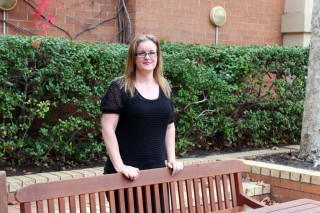Research links preeclampsia and children’s development

Studies by Notre Dame researcher Tegan Grace, which received the Best Poster Award at the 2015 Science on the Swan Conference in Western Australia, show that motor development at ages 10, 14 and 17 from pregnancies complicated by preeclampsia had poorer motor outcomes than children from either normotensive mothers or those with hypertension. PHOTO: UNDA
Award-winning research by The University of Notre Dame Australia’s Institute for Health Research has revealed that hypertensive diseases during pregnancy, in particular preeclampsia, have long-term and possibly permanent consequences for the motor development in offspring.
Studies by Notre Dame researcher Tegan Grace, which received the Best Poster Award at the 2015 Science on the Swan Conference in Western Australia, show that motor development at ages 10, 14 and 17 from pregnancies complicated by preeclampsia had poorer motor outcomes than children from either normotensive mothers or those with hypertension.
Preeclampsia is a pregnancy disorder characterised by high maternal blood pressure and severe fluid retention. It affects around five to ten per cent of all pregnancies in Australia and tends to be more common in a mother’s first pregnancy.
A total of 2,900 participants were involved in the Western Australian Pregnancy Cohort (Raine Study) and were recruited through King Edward Memorial Hospital between 16 and 20 weeks’ gestation. From the 2,900 pregnancies, 2,868 children were recruited for long-term follow-up. Data was taken from these children when aged 10, 14 and 17.
Mothers with preeclampsia were also found to have had higher incidences of other known risk factors that can affect offspring development, such as a lower socioeconomic status, higher stress levels in later pregnancy and shorter gestational length.
“One possible mechanism that may explain the association between maternal preeclampsia and offspring physical and motor outcomes may be a decrease in oxygen delivery to the fetus via the placenta that is seen in pregnancies complicated by preeclampsia,” Mrs Grace said.
“Additionally, the McCarron Assessment of Motor Development (MAND) tasks that were performed significantly worse by children in the preeclampsia group required underlying elements of postural control, proprioception and rhythm.
“For example, the broad jump necessitates the timing and synchronisation of the leg and core muscles, the dynamic extension of the leg and core muscles and the orientation of the whole body in space. Finger tapping also requires rhythm and the control of small muscle groups.
“It is possible that poorer performance in these tasks may be due to an interruption in the development and functioning of the cerebellum and associated neurological pathways caused by placental dysfunction.”
Mrs Grace hopes this research will bring greater awareness to this issue, along with others, that can affect the motor coordination development in children and adolescents, and identify ways to prevent it.
“It is important to remember with any area of development that the brain and neural system have a certain amount of plasticity and are particularly receptive to intervention during the early years,” Mrs Grace said.
“By monitoring a woman’s health during pregnancy, we can identify any potential problems early and apply effective intervention strategies to maximise the movement abilities of her child or children. It is also important to note that high blood pressure can be associated with stress.
“There are lots of extra pressures on pregnant women these days, especially with work and family commitments. Pregnancy should be a time where we are relaxing, enjoying the imminent arrival of a new family member, being kind to ourselves and putting our own health and wellbeing first.”
